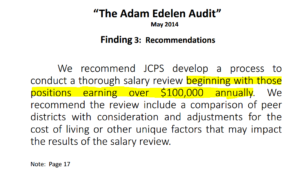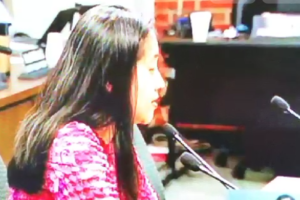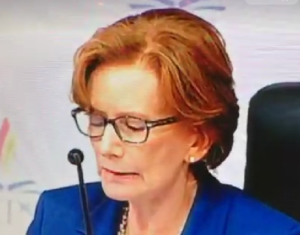 Dear Senators on the Education Committee,
Dear Senators on the Education Committee,
I write today to ask you to vote no on charter schools in Kentucky. I am a parent in Tennessee, but I can tell you from experience that charter schools are NOT the magic cure that you may think they are. Learn from Tennessee’s mistakes…
Let me tell you about the charter school that was just a few miles from my house. On the outside, it looked nice. With taxpayer money, this charter operator rented prime real estate in a strip mall on the busiest street in our town, bought fancy looking office chairs for students, and hung flat screen TVs so big you could see from the street. You can google it, it was called the “New Consortium of Law & Business Charter School.” For a school that pledged to teach students about law and business, it sure didn’t practice what it said it preached. The charter operator (who drove a shiny new BMW convertible, and probably still does) squandered taxpayer money, failed to pay the teachers and staff on time, and didn’t pay their insurance premiums as agreed to in their contracts which caused health insurance to lapse for employee’s families. Yes, it broke the law by not honoring its contracts, and it also had awful business management by not managing its cash flow to meet its expenses year-round, but there was nothing we as taxpayers could do about it. There was no elected board to talk to or hold accountable.
Even worse than hurting the adults employed there, the students were robbed of years of their education. That charter was supposed to be high-tech, with every student getting a personal laptop instead of textbooks. However, after the money ran out, students didn’t get their promised laptop, and teachers had no resources to teach with. It was a disaster. You can read parent complaints on Facebook about how their children were treated, how impossible it was to get their children’s report cards, and how difficult this charter was being when they tried to transfer their children back into public school. The school’s test scores ranked among the lowest in the state. It took several years before the local public school board was finally able to revoke that charter school’s charter and close it down last year. It was a disastrous experiment, and it was allowed to happen because the politicians in our state (who accepted huge campaign contributions from out-of-state charter organizations) voted to approve charters. Unfortunately, the children are now paying the price.
If you visit Memphis, you’ll likely see the huge expensive billboards on the interstate advertising charter schools. Realize the money spent on the billboards was money that should have been spent on students, on more guidance counselors, on lowering class sizes, on extra-curricular opportunities for children to excite them about education, on field trips, etc… Instead, a marketing firm and billboard company got that money. In the summer, you might see advertisements for parents to attend charter school events where they will be treated to massages and given free food to enroll their children in those charter schools. The money for that comes from the existing public schools which are already on shoe-string starvation budgets. It is shameful and wasteful. The poorest students suffer the most by having their public schools deprived of funding and resources to pay for the charter schools that serve a cherry-picked student body.
Charter schools are experts at making themselves look good. Here’s one way: My friends who teach in public schools in the inner city have told me how their public schools get a wave of new students in the spring just before the big state standardized TCAP test. Where do these new students come from? They were kicked out of the charter schools because their predicted test scores would lower the charter school’s average. Since this is after the “count” day for attendance, the money for these students stays at the charter school instead of going to the public school that is now educating them. It is shameful how these poor students are treated like pawns and money-makers.
Charter schools are excellent at marketing themselves, especially to legislators. Charter High Schools will brag that their school has 100% college acceptance rate and 100% graduation rate, but they won’t tell you the alarming number of students who were kicked out or held back. Ask how many students were in the freshman class, and how many made it to their senior year? You’ll be shocked to learn how low their retention rates are. Ask where the students went that they “counseled” out? These charter schools also won’t tell you that a requirement to graduate from their charter high school is to be accepted into a college (which is a lofty and worthwhile goal, of course), but they won’t tell you that they count ANY post-secondary institution (even the shady ones that accept anyone) as a “college.” The truth isn’t as pretty as it seems.
Disrupting and possibly destroying your strong public school system to create a parallel system that will be prone to mismanagement, manipulation, and greed to serve only a fraction of students whose parents can pass the gauntlet of the application process… it isn’t worth it. Take it from Tennessee. Charter vultures are eager to get into your state. The endless flow of tax dollars is too tempting. So, please, northern neighbor, learn from Tennessee’s mistakes. Vote against charters in Kentucky. Support strong public schools for every child who needs it.
Sincerely,
Jennifer P.
A Mom in TN
This information is from the Network for Public Education about Kentucky’s charter school bill:
HB 520 flew through the House on Friday, and will soon come before the Senate. The bill contains numerous provisions that have been damaging to public schools in other states.
The bill allows charters to contract with for-profit Educational Management Organizations (EMOs). EMOs will be able to design and implement the curriculum and manage charters– all for profit. This has proven to be disastrous in other states. In Michigan, home to Education Secretary and school choice advocate Betsy DeVos, 80% of charters operate for-profit, and charters are overwhelmingly represented in the lowest performing 5% of schools in the state.
The bill doesn’t place a cap on the number of charters that can open in Kentucky. With unlimited potential for growth, for-profit charters will be able to quickly grow and expand, with limited accountability and oversight.
As currently drafted, HB 520 fails to ensure that teachers in charter schools must be certified. It also fails to stipulate how charters will be funded, who will fund them, and how much funding they will receive.
 Dear JCPS,
Dear JCPS,
 Edelen came with the observation that administrative salaries were too high, not teachers’. So I’m not sure how this discussion led to the talking point that teachers are “overpaid.” I’m guessing the committee mix above could have had something to do with it. … Again, we feel that the make-up of this committee has led to some very short-sighted conclusions, and seems to have missed the point entirely.”
Edelen came with the observation that administrative salaries were too high, not teachers’. So I’m not sure how this discussion led to the talking point that teachers are “overpaid.” I’m guessing the committee mix above could have had something to do with it. … Again, we feel that the make-up of this committee has led to some very short-sighted conclusions, and seems to have missed the point entirely.”

 Dear Senators on the Education Committee,
Dear Senators on the Education Committee,